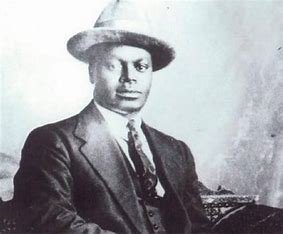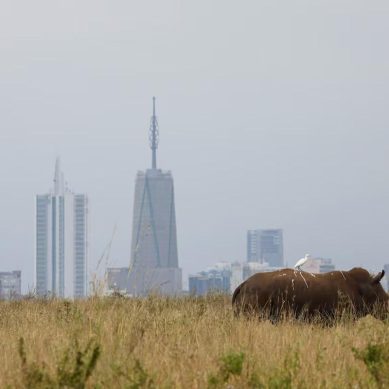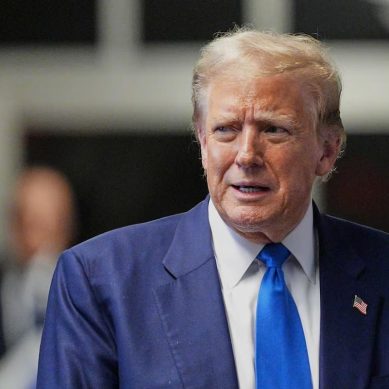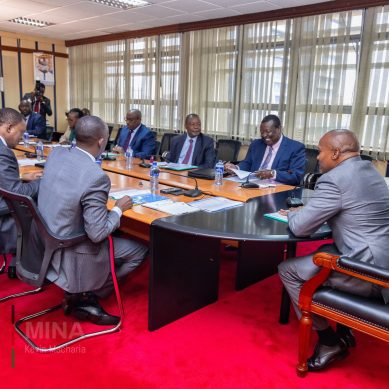
Corrupting Pan-Africanism and nationalism for ethnic supremacy: Case of Uganda in Great Lakes Region
Both the ideologies of Pan-Africanism and nationalism were responses of Black intellectuals to the brutal global colonisation, exploitation, enslavement, sometimes annihilation of people of black skins, in and outside Africa.
Pan-Africanism preceded nationalism in Africa. We can even say without it nationalism would have taken longer to take root. However, the two ideologies of Pan-Africanism and nationalism were not necessarily bedfellows and could proceed without each other, although they seemed to be mutually inclusive.
Indeed, as I will amplify below, Kwame Nkrumah, the pioneer leader of Ghana, which gained political independence before the rest of the other colonial enclaves created by the European colonisers of Africa, promoted Pan-Africanism as a movement for cooperation between all people of African descent, and for the political union of an independent Africa. His efforts resulted in the formation of the Organisation of African Unity (OAU), which brought together former colonies and spearheaded the decolonisation of the Continent.
OAU was, on the instigation slain Libyan strongman, Mammuar Gaddafi, succeeded by the African Union (AU), which was officially launched in 2002 with 55 members. South Africa since 1994 transitioned from the system of apartheid to one of majority rule. It was the latest to become decolonised until South Sudan became the Republic of South Sudan when it gained independence from Sudan, becoming the world’s youngest nation on July 9, 2011.
However, with the passage of time AU has become more bureaucratic and economic than political and under its jurisdiction more than 72 per cent of Africa’s land has been grabbed by seed companies or agribusiness firms claiming to be advancing agriculture on the continent. Yet most of the food they grow is sent to the countries where they come from.
Pan-Africanism was the attempt to create a sense of brotherhood and collaboration among all people of African descent whether they lived inside or outside of Africa. It held the idea that peoples of African descent have common interests and should be unified. However, although Kwameh Nkrumah wanted to take advantage of it to realise his dream of one Africa with one government, it did not originate in Africa or with him.
According to Britannica Pan-Africanism has historically often taken the shape of a political or cultural movement. However, according to The Republic, Pan-Africanism is a sociopolitical movement as well as a philosophy that advocates for the liberation of African people, their society and of African descendants in diaspora. It encompasses groups that advocated for the empowerment of Africans; those who fought against the degrading shackles of slavery; and those who advocated for the advancement of African individuality and culture.
It is true that Pan-Africanists stood against intellectual colonialism as well as political control and agitated for nationalism and the devolution of authority to Africans. We can say that the development and spread of African nationalism in the early twentieth century, as well as the resulting decolonisation of Africa and the breakdown of apartheid in South Africa in the 1990s, were important success stories of the Pan-African movement (PAM).
We know, however, that many varieties of Pan-Africanism exist. In its narrowest political manifestation Pan-Africanism envisions a unified African nation where all people of the African diaspora can live.
African diaspora refers to the long-term historical process by which people of African descent have been scattered from their ancestral homelands to other parts of the world. In more-general terms, however, Pan-Africanism is, according to The Republic, the sentiment that people of African descent have a great deal in common, a fact that deserves notice and even celebration. This does not in any way obliterate the fact that the African continent is punctuated by many indigenous groups scattered among many ethnic groups with different ecologies, histories and human energy systems.
As both an ideology and movement, Pan-Africanism is traceable to a West Indies man called Henry Sylvester Williams who, in 1897, formed the African Association in London in the United Kingdom (UK).
West Indies is a subregion of North America, surrounded by the North Atlantic Ocean and the Caribbean Sea, which comprises 13 independent islands. According to Wikipedia, the term West Indies is often interchangeable with the term Caribbean, although the latter may also include some Central and South American mainland nations, which have Caribbean coastlines, such as Belize, French Guiana, Guyana, and Suriname as well as the Atlantic Island nations of Barbados, Bermuda and Trinidad and Tobago, all of which are geographically distinct from the three main island groups, but culturally related.
Henry Sylvester Williams was a Black lawyer from Trinidad who practised law in London. He went on to organise the first Pan African meeting in 1900. This was attended by W.E.B Dubois, the most influential Black intellectual of the time in the USA. Dubois almost immediately became the torchbearer of Pan-Africanism globally. He organised global Pan-African conferences in the United Kingdom, Belgium and France, but initially Africa was not represented in any significant way.
According to Britannica, among the more-important Pan-Africanist thinkers of the first decades of the 20th century was Jamaican-born Black nationalist Marcus Garvey. In the years after World War One, Garvey championed the cause of African independence, emphasising the positive attributes of Black people’s collective past. His organisation, the Universal Negro Improvement Association (UNIA), boasted millions of members, envisioning and then making plans for a return “back to Africa.”
Garvey’s Black Star Line, a shipping company established in part to transport Blacks back to Africa as well as to facilitate global Black commerce, was ultimately unsuccessful. One wonders what Africa would emerge with Blacks from the diaspora streaming back to it.
From the 1920s through the 1940s, among the most-prominent Black intellectuals who advocated Pan-Africanist ideas were C.L.R James and George Padmore, both of whom came from Trinidad. From the 1930s until his death in 1959, Padmore was one of the leading theorists of Pan-African ideas. Also influential were Leopold Senghor and Aime Cesaire who were natives of Senegal and Martinique, respectively.
Senghor rose to become the first leader of independent Senegal. A disciple of Padmore, Jomo Kenyatta of Kenya, also manifested as an important figure in Pan-Africanist thought. He also became the first leader of independent Kenya. Pan-Africanism remained largely an ideology of Black people outside Africa, until much later when nationalist leaders such as Jomo Kenyatta and Kwameh Nkrumah were invited to participate.
However, as mentioned above it was Nkrumah who attempted to make the ideology of Pan-Africanism relevant in Africa. Nkrumah foresaw a period when Africa would be unified and coined the term ‘Pan-Africanism’ in the 1960s. He thought that African unification was essential for the continent’s economic, social and political growth. He envisioned Pan-Africanism as a means of uniting and uplifting Africans across Africa and the diaspora but was ousted in 1966 before achieving his aim.
However, most newly independent African governments opposed and rejected Pan-Africanism because of the perceived threat it represented to their national sovereignty, and that was the end of Nkrumah’s dream of a united Africa politically, socially and economically under one government. In fact, Senghor and Kenyatta conducted themselves as far removed from Pan-Africanism while they were in power in their countries.
Over-exacerbated nationalism threatens to continue to undermine Pan-Africanism globally and in Africa. Its abuse and use to oppress, repress and suppress vulnerable peoples, combined with the use of Pan-Africanism to prevent democratisation, will continue to make African intellectuals in Africa to be suspicious of the two ideologies. The appeal of both Pan-Africanism and nationalism has declined to a bare minimum as African rulers’ love for power, money and domination of their citizens make the two ideologies dysfunctional.
In some countries such as Equatorial Guinea, Angola and Gabon familial rule completely made the nations personal possessions and nationalism died out and Pan-Africanism became a meaningless concept. However, as an acceptable ideology, several definitions of nationalism have been advanced. Britannica defines nationalism as an ideology based on the premise that individual loyalty and devotion to the nation-state surpasses individual or group interests.
Merriam-webster.com defines nationalism as loyalty and devotion to a nation, especially a sense of national consciousness. Sciencedirect.com sees nationalism as the ideology of the nation-state standing for the sense of togetherness of a people in terms of ethnic, religious, linguistic and territorial identity. The balancemoney.com sees nationalism as the idea that your nation often identified by shared ethnicity or sets of values is better than all other nations. Oxfordre.com sees nationalism as a set of beliefs about the nation, its origins, nature and values.
One African ruler, Yoweri Tibuhaburwa Museveni of Uganda has sold Pan-Africanism as the reason why he has overstayed and should stay in power until he achieves the political union of East Africa and Africa. But that is localising, may be regionalising or continentalising Pan-Africanism for personal power. However, like before, independent African states continue to promote and defend their nationalisms and to build military power to this end.
As I have pointed out in the case of Angola, Equatorial Guinea and Gabon, nationalism no longer makes sense under familial rule, which is the case in Uganda as well. ostensibly to protect its sovereignty. Like in Angola, Equatorial Guinea and Gabon, military power in Uganda is not being used to secure nationalism and sovereignty of the country.
One school of thought maintains that Tibuhaburwa Museveni is using Pan-Africanism to establish political and military hegemony of his small ethnic group called Tutsi over East Africa and the Great Lakes Region, and simultaneously build his personal sovereignty over the peoples of East Africa and Great Lakes Region. The school reasons that the president is being driven by a strong greed for power and resources.
According to the school of thought, he has not only tuned Pan-Africanism to serve his own goals and interests of power, glory and resources, but is using it to extend and proliferate the traditional imperial interests and goals of the West, the new imperialism of India and China and the new imperialism of his small ethnic group of primitive accumulation by grabbing lands and resources not only in Uganda but also in the whole of the Great Lakes Region.
Of course, the stance of the school of thought cited here needs to be researched to establish its credibility. However, what is true is that we are witnessing grabs of land and resources in Uganda by members of the small ethnic groups or those connected to it. For example, indigenous Ugandans are frequently told that resources such as oil and gold are not theirs and they should not put hope in them but concentrate on agriculture.
There is also accumulating evidence that members of the ethnic group resident in Uganda and Rwanda as the ruling class and eastern Democratic Republic of Congo (DRC) as refugees referred to as Banyamulenge, are either separately or jointly operating in that country to plunder, annihilate life and create insecurity hotspots in the country to justify their continued military operations in the country. The refugees claim they are being discriminated against by the Congolese and want equal status in the country (which is politically abnormal).
The rulers of both Rwanda and Uganda are overstretching the national budgets of the two countries to achieve their imperial, political and economic gains in the DRC. However, their onslaughts promote the nationalism of their small ethnic group, they distort and misrepresent Pan-Africanism and its original ideals when they make it serve only their interests in the Great Lakes Region.
It is not clear whether or not Uganda is a nation with common values and beliefs. The country is certainly diverse in ethnicity, sets of values, linguistically and peoples. It is best described as a mega-nation, formed by subduing or crashing traditional nation-states of Acholi, Ankole, Buganda, Bugisu, Bukedi, Bunyoro, Busoga, Karamoja, Kigezi, Lango, Moyo, Sebei, Teso, Toro and West Nile. These are daily being broken into small meaningless entities under the guise of taking services to the people, yet it is “divide and rule” more crude than that introduced by the British colonialists.
The divide and rule of today is intended to ensure that the indigenous communities cannot communicate or jointly protect their interests, local ownership, local sovereignty, cultures and resources against the invasive small ethnic group in power in Kampala. It is instead being driven by a sense of imposing the beliefs and cultures of the ethnic group dominating power in Kampala. That cannot be sustainable and is an antithesis of both nationalism and Pan-Africanism. It is also a distortion of both nationalism and Pan-Africanism and can only serve to sow seeds of ethnic supremacy and domination.
Unification of peoples for a common cause is occluded. Instead, grounds for conflicts and disintegration are laid well in the future.
For God and my country
- A Tell report / By Prof Oweyegha-Afunaduula, a former professor in the Department of Environmental Sciences of the Makerere University, Uganda











